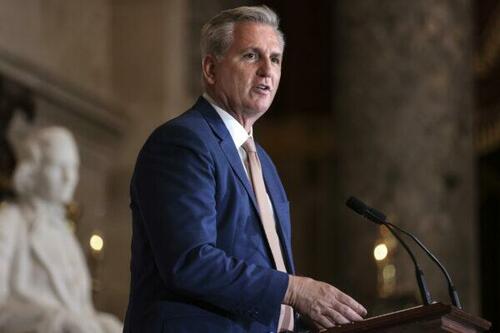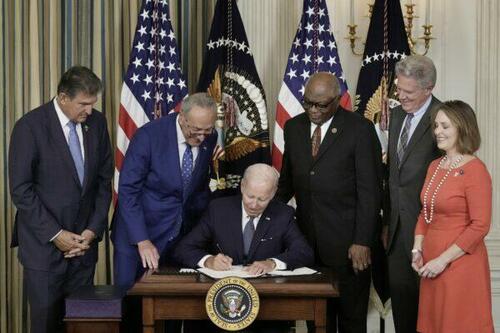
Authored by Joseph Lord via The Epoch Times,
House Minority Leader Kevin McCarthy (R-Calif.) on Sept. 23 unveiled Republicans’ “Commitment to America” plan, which includes a litany of policy promises on various issues.
While the race for the Senate is generally considered slightly favorable for Democrats, in the House it’s widely expected that Republicans will be in control next year.
If they do take the lower chamber, McCarthy is on track to become speaker of the House.
‘A Plan for a New Direction’
McCarthy on Sept. 23 sat down with “Capitol Report” on NTD to discuss the plan, which he called “a plan for a new direction.”
He said that the plan is about “the American public, not about the politicians in Washington."
“For last year and a half, we’ve gone across the nation listening to Americans,” he continued. “And they’re fearful. They wonder whether they can afford it—can they afford to fill up their gas, can they go to the grocery store again which now costs more?”
Adding to these worries, McCarthy noted, is rapidly-rising inflation, which over the past year has broken record after record.
“Now [Americans’] take-home pay is less,” he said. “They only get 11 months, they lost one month of their wages, because the Democrats have caused inflation. And so what we think you should do is actually have a plan for a new direction.”
“That’s what the commitment to America is—a plan for a new direction where we’ll have an economy that’s strong, we take away this runaway spending [by] Democrats, we make America energy independent, so your price of gas goes lower, more money in your pocket, inflation gets slowed down.”
House Minority Leader Kevin McCarthy (R-Calif.), speaks during the Congressional Gold Medal Ceremony to honor the merchant mariners of World War II in Washington May 18, 2022. (Oliver Contreras/Getty Images)
Stop ‘Runaway Spending,’ Address Inflation
The key pillars of the plan re-articulate oft-repeated GOP criticisms of the current regime.
One such position is a promise to stop Democrats’ “runaway spending.” Since they thinly took the majority of both chambers, Democrats have spent a staggering amount of money, and the cost of consumer essentials has risen by over eight percent on average.
In March 2021, the party used the partisan reconciliation process to pass a $1.9 trillion COVID relief bill dubbed the American Rescue Plan with no GOP support or input. Later, the majority party was joined by a handful of Republicans in each chamber to pass a $1.2 trillion infrastructure bill.
At the same time, the party pushed for an even more expensive reconciliation, the Build Back Better Act. In its first draft, the 2,000-page bill would have cost $3.5 trillion. Later, in an effort to win the crucial support of Sens. Joe Manchin (D-W. Va.) and Kyrsten Sinema (D-Ariz.), that figure was dropped to $1.75 trillion, but this bill also failed when Manchin announced that he would not support the package at all.
Most recently, the party again turned to the reconciliation process to pass the Inflation Reduction Act, a bill that carried over some key elements of Build Back Better and which will cost taxpayers over $700 billion.
President Joe Biden signs the Inflation Reduction Act as Democrat lawmakers look on at the White House in Washington, on Aug. 16, 2022. (Drew Angerer/Getty Images)
In total, these three bills alone come out to well over $3.8 trillion spent by the majority party over the course of only a few short years.
Republicans have been highly critical of this pattern of spending, which they argue is the largest factor behind soaring inflation that has reduced the spending power of the dollar by almost 10 percent. McCarthy made just this point.
“If you watch, how did inflation start, it wasn’t just Republicans warning the Democrats because remember, only Democrats voted for the American Rescue Plan,” McCarthy said.
McCarthy also noted that the GOP position was influential among even many Democrat economists.
“Larry Summers, a Democrat, [and] former Secretary of the Treasury warned them not to do it, you cause inflation,” McCarthy said. “Steve Rattner, an economic adviser to [President Barack Obama] calls it ‘the original sin of inflation.'”
“We’ve got to stop that runaway spending,” the California Republican added.
Restore US Energy Independence
Republicans will also seek to restore American energy independence if they take the House, McCarthy said.
Under President Donald Trump, the United States became energy independent for the first time in decades. But when he took office, President Joe Biden, citing the so-called “climate crisis,” significantly cut U.S. energy capacity by shuttering the long-debated Keystone XL Pipeline and by declaring a moratorium on new oil and natural gas leases on federal lands.
At the time, critics warned that these policies would substantially raise gas prices. When the predicted price spikes came about, Biden pulled millions of barrels of oil from the Strategic Petroleum Reserve rather than reversing his energy policies. Republicans joined by Joe Manchin unanimously opposed the move, calling on Biden to reverse his policies rather than pulling from U.S. reserves, which were intended to be used in case of global or financial crises.
If they take the House, McCarthy said that Republicans will work to restore America’s energy sector.
A person uses the keypad on a pump at a gas station in Arlington, Va., on July 29, 2022. (Olivier Douliery/AFP via Getty Images)
Beyond Democrats’ spending, McCarthy noted that the rising costs of energy have had a substantial impact in worsening inflation.
“Another cause of inflation is the rise of energy costs,” he said. “So we’re going to make America energy independent, create more American jobs, but lower the price. The energy cost goes in every product and good.
“We’re going to make a sound economy with sound money policies,” he added. “That’s a start to get us under control.”
‘A Nation That’s Safe’
McCarthy also said that Republicans will work to reduce crime rates.
Over the past two years, cities across the U.S. have begun to see higher and higher rates of violent crime, with many cities breaking past records for homicide rates.
Republicans have blamed the situation in part on the “soft-on-crime” attitude of Democrats and liberals in the criminal justice system.
Following the death of George Floyd in 2020, anti-police sentiments spiked among liberals, and in several major cities prosecutors and district attorneys have refused to enforce several laws.
Speaking on this issue, McCarthy said, “We believe in a nation that’s safe.”
“We watch the Democrats defund the police and crime rises—from Portland to Philadelphia, it’s the highest it’s been in 20 years,” he continued. “So we … will make sure we don’t defund the police. We’ll actually bring 200,000 more police officers, we put the accountability to these prosecutors and [district attorneys] to uphold the law fairly and equally.”
House Minority Leader Kevin McCarthy (R-Calif.) speaks with U.S. Capitol Police Officers after arriving on a bicycle to an event at the National Law Enforcement Officers Memorial as part of the “Back The Blue” bike ride in Washington, on May 12, 2022. (Anna Moneymaker/Getty Images)
After largely evading the issue during most of the 117th Congress, Democrats on Sept. 22 finally tried to address rising crime rates with a series of policing bills that passed through the House along broadly party lines. The move, coming as it does only weeks out from a midterm election, raised eyebrows among observers after two years of largely anti-police sentiments among many Democrats.
‘A Future That’s Built on Freedom’
McCarthy also vowed that Republicans will address ongoing controversies in public schools about parents’ rights.
Schools in several major cities have faced scrutiny for the content being taught to children, which has included controversial topics like homosexuality, critical race theory, and graphic representations of nudity or sexual intercourse sometimes shown to children as young as primary school age. In turn, many parents in school districts across the United States have turned up to school board meetings to challenge the material being taught to their children.
If Republicans take the House, McCarthy promised a long-touted “parents bill of rights,” which McCarthy said would ensure that “parents have a say in their children’s education.”
The issue has increasingly become a rallying cry for Republicans.
Republican Glenn Youngkin made the issue the central pillar of his 2021 gubernatorial race in Virginia, which he later won by margins far wider than observers had predicted.
A local mother at a rally outside the Loudoun County Public Schools administration building in Ashburn, Va., on Sept. 13, 2022. (Terri Wu/The Epoch Times)
Florida Governor Ron DeSantis has also put focus on the issue, lobbying and successfully passing a bill that forbids schools from teaching young children about issues like sex, gender identity, or sexual orientation. Though critics dubbed the legislation the “don’t say gay” bill, polls on it have generally shown that most Americans support the move.
The role of parents in determining what schools teach their children has largely become a mainstream issue only in the past year or two, and it remains to be seen whether the issue can rally new voters to the GOP’s banner in November.
Investigations to ‘Hold the Government Accountable’
McCarthy also vowed that Republicans would look into a series of controversial issues and decisions by the current administration through new probes and investigative panels.
The current rules of the lower chamber give the speaker of the House substantially broad authority over the creation of new committees and probes, meaning that Republicans have largely been unable to use the full force of Congress to investigate things they find potentially concerning.
Under Republicans, McCarthy said, the government is “going to be held accountable.”
“We’re … going to look from the aspects of holding government accountable, as well as the DOJ going after parents,” McCarthy added, referencing a controversial decision from the Department of Justice to pursue parents attending school board meetings to protest their children’s curriculum.
McCarthy also promised accountability from China through a probe into the origins of the COVID-19 virus, which is now widely recognized to have likely leaked from a biological research facility in Wuhan, China.
“Why don’t we find out where the origin of COVID started,” he said.
McCarthy said that he’d also create a select committee on China that would look at ways to have U.S. industries, that were shipped there, return to America.
Workers inside the P4 laboratory in Wuhan, capital of China’s Hubei Province, on Feb. 23, 2017. (Johannes Eisele/AFP via Getty Images)
Republicans have also suggested probes into Dr. Anthony Fauci’s ties to the Wuhan facility, the role of Speaker of the House Nancy Pelosi (D-Calif.) in leaving the Capitol building unprepared on Jan. 6, and the recent raid by the FBI of Trump’s Mar-a-Lago home.
Undoing Democrats’ IRS Expansion
McCarthy said that if they take the House, Republicans will also work to undo Democrats’ recent expansion of the IRS.
Specifically, the expansion was included as part of the Inflation Reduction Act, which sextupled the IRS’ current budget overnight.
The IRS provisions of the Inflation Reduction Act were among its most controversial.
The $80 billion allocated to the agency by the bill sextuples its budget, and Republican critics have warned that the bulked-up IRS could hire as many as 87,000 new agents. These agents, in turn, critics have said, will be let loose against middle-class Americans and small businesses, despite Democrats’ claims about the expansion that nobody making less than $400,000 per year will see their tax bill increase.
Proponents of the bill suggest that, in addition to the new tax code changes, a bulkier IRS will bring in an additional $124 billion annually through enforcement efforts.
The funding for the IRS will go toward “necessary expenses for tax enforcement activities … to determine and collect owed taxes, to provide legal and litigation support, to conduct criminal investigations (including investigative technology), to provide digital asset monitoring and compliance activities, to enforce criminal statutes related to violations of internal revenue laws and other financial crimes … and to provide other services.”
The Internal Revenue Service headquarters building in Washington is seen in a file photo. (Chip Somodevilla/Getty Images)
Preston Brashers, a senior tax policy analyst at the Heritage Foundation, told The Epoch Times that contrary to Democrat claims, the IRS expansion will almost certainly mean more audits, and in turn more taxes, for middle-class families and small businesses.
“On the very first day, [we’re going to] repeal 87,000 IRS agents,” McCarthy said.
However, this promise may be impossible for McCarthy to keep, particularly if Democrats retain the Senate. Because the Inflation Reduction Act was passed using the filibuster-immune reconciliation process, Republicans theoretically could repeal the expansion of the IRS if they take both chambers of Congress. But even in this case, the measure would need the signature of President Biden, who’s likely to oppose any such move.
Limitations
Despite the broad range of promises and proposals discussed by McCarthy, Republicans will likely face many limitations on how much they can do, particularly if they only take the House.
Currently, Republicans seem to be on track to reenter the House majority after four years in the minority, but the Senate is less certain. Though Senate races in several states remain nail-bitingly tight, observers currently peg the fight for the Senate as leaning heavily in Democrats’ favor.
Right now, FiveThirtyEight gives Republicans a 71 in 100 chance of retaking the House after four years in the minority. But FiveThirtyEight also gives Republicans only a 29 in 100 chance of reclaiming the upper chamber.
If these projections pan out, Senate Democrats would find their scope heavily limited by the Republican House, while the Republican House would find its scope severely limited by the Senate. If the race does end in a divided government, it is likely that McCarthy will face substantial hurdles to rolling out the policy proposals in the Commitment to America plan.
On the other hand, House Republicans would have the benefit of Manchin’s swing vote, which could help them get some budget reconciliation legislation over the finish line in the Senate.
Nevertheless, even in the best case for Republicans—control of both chambers of Congress—the White House will still be occupied by a Democrat, meaning that a fully Republican Congress’s most ambitious goals would be difficult or impossible to carry out.
Authored by Joseph Lord via The Epoch Times,
House Minority Leader Kevin McCarthy (R-Calif.) on Sept. 23 unveiled Republicans’ “Commitment to America” plan, which includes a litany of policy promises on various issues.
While the race for the Senate is generally considered slightly favorable for Democrats, in the House it’s widely expected that Republicans will be in control next year.
If they do take the lower chamber, McCarthy is on track to become speaker of the House.
‘A Plan for a New Direction’
McCarthy on Sept. 23 sat down with “Capitol Report” on NTD to discuss the plan, which he called “a plan for a new direction.”
He said that the plan is about “the American public, not about the politicians in Washington.”
“For last year and a half, we’ve gone across the nation listening to Americans,” he continued. “And they’re fearful. They wonder whether they can afford it—can they afford to fill up their gas, can they go to the grocery store again which now costs more?”
Adding to these worries, McCarthy noted, is rapidly-rising inflation, which over the past year has broken record after record.
“Now [Americans’] take-home pay is less,” he said. “They only get 11 months, they lost one month of their wages, because the Democrats have caused inflation. And so what we think you should do is actually have a plan for a new direction.”
“That’s what the commitment to America is—a plan for a new direction where we’ll have an economy that’s strong, we take away this runaway spending [by] Democrats, we make America energy independent, so your price of gas goes lower, more money in your pocket, inflation gets slowed down.”
House Minority Leader Kevin McCarthy (R-Calif.), speaks during the Congressional Gold Medal Ceremony to honor the merchant mariners of World War II in Washington May 18, 2022. (Oliver Contreras/Getty Images)
Stop ‘Runaway Spending,’ Address Inflation
The key pillars of the plan re-articulate oft-repeated GOP criticisms of the current regime.
One such position is a promise to stop Democrats’ “runaway spending.” Since they thinly took the majority of both chambers, Democrats have spent a staggering amount of money, and the cost of consumer essentials has risen by over eight percent on average.
In March 2021, the party used the partisan reconciliation process to pass a $1.9 trillion COVID relief bill dubbed the American Rescue Plan with no GOP support or input. Later, the majority party was joined by a handful of Republicans in each chamber to pass a $1.2 trillion infrastructure bill.
At the same time, the party pushed for an even more expensive reconciliation, the Build Back Better Act. In its first draft, the 2,000-page bill would have cost $3.5 trillion. Later, in an effort to win the crucial support of Sens. Joe Manchin (D-W. Va.) and Kyrsten Sinema (D-Ariz.), that figure was dropped to $1.75 trillion, but this bill also failed when Manchin announced that he would not support the package at all.
Most recently, the party again turned to the reconciliation process to pass the Inflation Reduction Act, a bill that carried over some key elements of Build Back Better and which will cost taxpayers over $700 billion.
President Joe Biden signs the Inflation Reduction Act as Democrat lawmakers look on at the White House in Washington, on Aug. 16, 2022. (Drew Angerer/Getty Images)
In total, these three bills alone come out to well over $3.8 trillion spent by the majority party over the course of only a few short years.
Republicans have been highly critical of this pattern of spending, which they argue is the largest factor behind soaring inflation that has reduced the spending power of the dollar by almost 10 percent. McCarthy made just this point.
“If you watch, how did inflation start, it wasn’t just Republicans warning the Democrats because remember, only Democrats voted for the American Rescue Plan,” McCarthy said.
McCarthy also noted that the GOP position was influential among even many Democrat economists.
“Larry Summers, a Democrat, [and] former Secretary of the Treasury warned them not to do it, you cause inflation,” McCarthy said. “Steve Rattner, an economic adviser to [President Barack Obama] calls it ‘the original sin of inflation.’”
“We’ve got to stop that runaway spending,” the California Republican added.
Restore US Energy Independence
Republicans will also seek to restore American energy independence if they take the House, McCarthy said.
Under President Donald Trump, the United States became energy independent for the first time in decades. But when he took office, President Joe Biden, citing the so-called “climate crisis,” significantly cut U.S. energy capacity by shuttering the long-debated Keystone XL Pipeline and by declaring a moratorium on new oil and natural gas leases on federal lands.
At the time, critics warned that these policies would substantially raise gas prices. When the predicted price spikes came about, Biden pulled millions of barrels of oil from the Strategic Petroleum Reserve rather than reversing his energy policies. Republicans joined by Joe Manchin unanimously opposed the move, calling on Biden to reverse his policies rather than pulling from U.S. reserves, which were intended to be used in case of global or financial crises.
If they take the House, McCarthy said that Republicans will work to restore America’s energy sector.
A person uses the keypad on a pump at a gas station in Arlington, Va., on July 29, 2022. (Olivier Douliery/AFP via Getty Images)
Beyond Democrats’ spending, McCarthy noted that the rising costs of energy have had a substantial impact in worsening inflation.
“Another cause of inflation is the rise of energy costs,” he said. “So we’re going to make America energy independent, create more American jobs, but lower the price. The energy cost goes in every product and good.
“We’re going to make a sound economy with sound money policies,” he added. “That’s a start to get us under control.”
‘A Nation That’s Safe’
McCarthy also said that Republicans will work to reduce crime rates.
Over the past two years, cities across the U.S. have begun to see higher and higher rates of violent crime, with many cities breaking past records for homicide rates.
Republicans have blamed the situation in part on the “soft-on-crime” attitude of Democrats and liberals in the criminal justice system.
Following the death of George Floyd in 2020, anti-police sentiments spiked among liberals, and in several major cities prosecutors and district attorneys have refused to enforce several laws.
Speaking on this issue, McCarthy said, “We believe in a nation that’s safe.”
“We watch the Democrats defund the police and crime rises—from Portland to Philadelphia, it’s the highest it’s been in 20 years,” he continued. “So we … will make sure we don’t defund the police. We’ll actually bring 200,000 more police officers, we put the accountability to these prosecutors and [district attorneys] to uphold the law fairly and equally.”
House Minority Leader Kevin McCarthy (R-Calif.) speaks with U.S. Capitol Police Officers after arriving on a bicycle to an event at the National Law Enforcement Officers Memorial as part of the “Back The Blue” bike ride in Washington, on May 12, 2022. (Anna Moneymaker/Getty Images)
After largely evading the issue during most of the 117th Congress, Democrats on Sept. 22 finally tried to address rising crime rates with a series of policing bills that passed through the House along broadly party lines. The move, coming as it does only weeks out from a midterm election, raised eyebrows among observers after two years of largely anti-police sentiments among many Democrats.
‘A Future That’s Built on Freedom’
McCarthy also vowed that Republicans will address ongoing controversies in public schools about parents’ rights.
Schools in several major cities have faced scrutiny for the content being taught to children, which has included controversial topics like homosexuality, critical race theory, and graphic representations of nudity or sexual intercourse sometimes shown to children as young as primary school age. In turn, many parents in school districts across the United States have turned up to school board meetings to challenge the material being taught to their children.
If Republicans take the House, McCarthy promised a long-touted “parents bill of rights,” which McCarthy said would ensure that “parents have a say in their children’s education.”
The issue has increasingly become a rallying cry for Republicans.
Republican Glenn Youngkin made the issue the central pillar of his 2021 gubernatorial race in Virginia, which he later won by margins far wider than observers had predicted.
A local mother at a rally outside the Loudoun County Public Schools administration building in Ashburn, Va., on Sept. 13, 2022. (Terri Wu/The Epoch Times)
Florida Governor Ron DeSantis has also put focus on the issue, lobbying and successfully passing a bill that forbids schools from teaching young children about issues like sex, gender identity, or sexual orientation. Though critics dubbed the legislation the “don’t say gay” bill, polls on it have generally shown that most Americans support the move.
The role of parents in determining what schools teach their children has largely become a mainstream issue only in the past year or two, and it remains to be seen whether the issue can rally new voters to the GOP’s banner in November.
Investigations to ‘Hold the Government Accountable’
McCarthy also vowed that Republicans would look into a series of controversial issues and decisions by the current administration through new probes and investigative panels.
The current rules of the lower chamber give the speaker of the House substantially broad authority over the creation of new committees and probes, meaning that Republicans have largely been unable to use the full force of Congress to investigate things they find potentially concerning.
Under Republicans, McCarthy said, the government is “going to be held accountable.”
“We’re … going to look from the aspects of holding government accountable, as well as the DOJ going after parents,” McCarthy added, referencing a controversial decision from the Department of Justice to pursue parents attending school board meetings to protest their children’s curriculum.
McCarthy also promised accountability from China through a probe into the origins of the COVID-19 virus, which is now widely recognized to have likely leaked from a biological research facility in Wuhan, China.
“Why don’t we find out where the origin of COVID started,” he said.
McCarthy said that he’d also create a select committee on China that would look at ways to have U.S. industries, that were shipped there, return to America.
Workers inside the P4 laboratory in Wuhan, capital of China’s Hubei Province, on Feb. 23, 2017. (Johannes Eisele/AFP via Getty Images)
Republicans have also suggested probes into Dr. Anthony Fauci’s ties to the Wuhan facility, the role of Speaker of the House Nancy Pelosi (D-Calif.) in leaving the Capitol building unprepared on Jan. 6, and the recent raid by the FBI of Trump’s Mar-a-Lago home.
Undoing Democrats’ IRS Expansion
McCarthy said that if they take the House, Republicans will also work to undo Democrats’ recent expansion of the IRS.
Specifically, the expansion was included as part of the Inflation Reduction Act, which sextupled the IRS’ current budget overnight.
The IRS provisions of the Inflation Reduction Act were among its most controversial.
The $80 billion allocated to the agency by the bill sextuples its budget, and Republican critics have warned that the bulked-up IRS could hire as many as 87,000 new agents. These agents, in turn, critics have said, will be let loose against middle-class Americans and small businesses, despite Democrats’ claims about the expansion that nobody making less than $400,000 per year will see their tax bill increase.
Proponents of the bill suggest that, in addition to the new tax code changes, a bulkier IRS will bring in an additional $124 billion annually through enforcement efforts.
The funding for the IRS will go toward “necessary expenses for tax enforcement activities … to determine and collect owed taxes, to provide legal and litigation support, to conduct criminal investigations (including investigative technology), to provide digital asset monitoring and compliance activities, to enforce criminal statutes related to violations of internal revenue laws and other financial crimes … and to provide other services.”
The Internal Revenue Service headquarters building in Washington is seen in a file photo. (Chip Somodevilla/Getty Images)
Preston Brashers, a senior tax policy analyst at the Heritage Foundation, told The Epoch Times that contrary to Democrat claims, the IRS expansion will almost certainly mean more audits, and in turn more taxes, for middle-class families and small businesses.
“On the very first day, [we’re going to] repeal 87,000 IRS agents,” McCarthy said.
However, this promise may be impossible for McCarthy to keep, particularly if Democrats retain the Senate. Because the Inflation Reduction Act was passed using the filibuster-immune reconciliation process, Republicans theoretically could repeal the expansion of the IRS if they take both chambers of Congress. But even in this case, the measure would need the signature of President Biden, who’s likely to oppose any such move.
Limitations
Despite the broad range of promises and proposals discussed by McCarthy, Republicans will likely face many limitations on how much they can do, particularly if they only take the House.
Currently, Republicans seem to be on track to reenter the House majority after four years in the minority, but the Senate is less certain. Though Senate races in several states remain nail-bitingly tight, observers currently peg the fight for the Senate as leaning heavily in Democrats’ favor.
Right now, FiveThirtyEight gives Republicans a 71 in 100 chance of retaking the House after four years in the minority. But FiveThirtyEight also gives Republicans only a 29 in 100 chance of reclaiming the upper chamber.
If these projections pan out, Senate Democrats would find their scope heavily limited by the Republican House, while the Republican House would find its scope severely limited by the Senate. If the race does end in a divided government, it is likely that McCarthy will face substantial hurdles to rolling out the policy proposals in the Commitment to America plan.
On the other hand, House Republicans would have the benefit of Manchin’s swing vote, which could help them get some budget reconciliation legislation over the finish line in the Senate.
Nevertheless, even in the best case for Republicans—control of both chambers of Congress—the White House will still be occupied by a Democrat, meaning that a fully Republican Congress’s most ambitious goals would be difficult or impossible to carry out.














